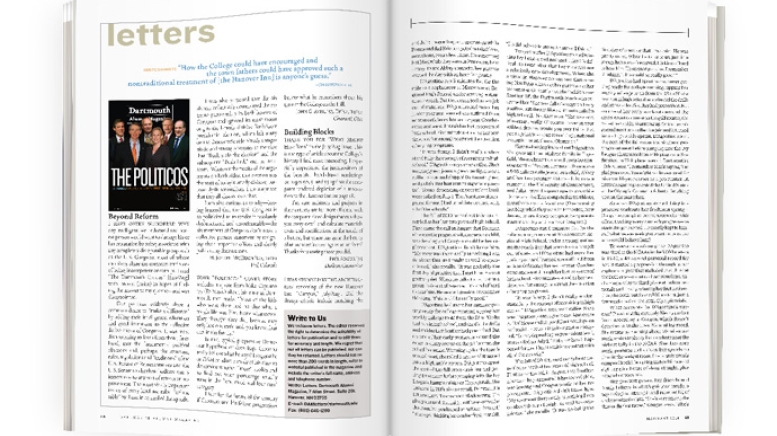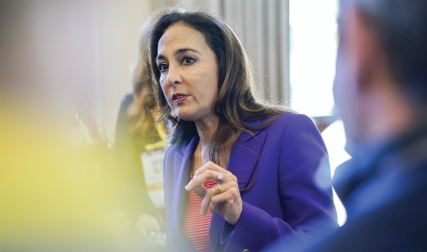Beyond Reform I have often wondered why any intelligent, well-educated and honest person would want to damage his or her reputation by being associated with any completely disreputable group such as the U.S. Congress, most of whose members share the common attributes of being incompetent or corrupt. I read “The Dartmouth Caucus” [July/Aug] with interest (twice) in hopes of finding the answer to my question and was disappointed. Our politicos evidently share a common desire to “make a difference” by adding their intelligence, education and good intentions to the collective deliberations of Congress. It was most disheartening to learn from them, firsthand, that the fundamental political obstacles and, perhaps, the structure, rules, regulations and “traditions” of the U.S. House of Representatives and the U.S. Senate render these bodies virtually impervious to any sort of reform or improvement. The most vitally important issues of every kind are ruled “off the table” by those in control of the agenda. I was also surprised that the six alumni collectively downplayed the extreme partisanship in both houses of Congress and ignored its most recent origin: the bitterly divisive Bush/Gore presidential election, which left many on the Democratic side bitterly antagonistic and strong advocates of the view that “Bush stole the election” and the subsequent “Bush lied,” etc., ad nauseam. Whatever the merits of the arguments on both sides, that election was the start of today’s utterly divisive, partisan dysfunctionalism. I am surprised that they all glossed over that. I am also curious as to why—having learned that the U.S. Congress is so politicized as to render it resolutely dysfunctional and un-reformable—the six members of Congress don’t make a collective protest statement by resigning their respective offices and clearly publicizing their reasons.
M. Joseph McHugh ’60, Tu’61 Vail, Colorado
Your “Politicos” cover story includes a quote from Mike Capuano ’73 (D-Mass.) about his time at Dartmouth that reads: “Most of the kids who went there had no clue what a tough life was like. None whatsoever. They thought they did, because they only had one maid and, you know, four cars in the family.” Is that typical progressive Democrat hyperbole or does Rep. Capuano really believe what he says? I suggest he or DAM conduct a study of his class to determine whether “most” applies and to find out what percentage actually were in the “one maid and four cars” category. I fear for the future of the country if Capuano and his fellow progressives believe what he remembers about his time at the College on the Hill.
John G. Avril ’53, Th’54, Tu’54 Cincinnati, Ohio
Building Blocks Thank you for “What Might Have Been” in the July/Aug issue. This is the type of article about the College’s history I find most interesting. I especially appreciated the juxtaposition of the beautiful hand-drawn renderings on pages 50, 51 and 55 against the computer-rendered depiction of a renovation to the Hanover Inn on page 18. I’m sure architects and projects in their entirety are far more efficient with the computer-aided design that can show you every detail and calculate materials costs and specifications at the touch of a button, but where has gone the beauty of an architect’s drawings as an art form? Thanks for showing those you did.
Phil Augur ’95 Durham, Connecticut
I was stunned by the architectural rendering of the new Hanover Inn [“Campus,” July/Aug]. Did the design criteria include matching the cold, charmless feel of the Hop or the blandness of the north campus? Was the architect instructed to give Hanover a Marriott or Sheraton look-alike as the new focal point for the town? How the College could have encouraged and the town fathers could have approved such an nontraditional treatment of a key structure is anyone’s guess. At least the design could have retained the white railing around the porch so old timers could put their feet up and reminisce about the days when the campus was known for, and proud of, its classic beauty.
Jim Lustenader ’66 Bonita Springs, Florida
Spare Tire I was delighted to see “Pumped Up” [July/Aug] by Ed Gray ’67 about the Prouty bike-ride fundraiser for the Norris Cotton Cancer Center. When I described to Ed my role as a clown in the festivities before the Prouty, I must have misspoken. It was at Storrs Pond, not Occom. Disturbing Occom’s placid sheet generates an immediate response by the constabulary, who seldom fail to collar the offender. As originally imagined, the skit involved a clown making a mess of bike-tire repair. It was to conclude with the inner tube being inflated until it exploded. When the air compressor motor overheated and quit before the tube could burst, I was left standing in the middle of a grossly over-filled tube and an unfulfilled audience. There was now only one possible finale. I put the tube around my middle, climbed onto the now tireless bike and rode it into the pond until both the tube and I floated free.
Ross McIntyre ’53, DMS’55 Lyme, New Hampshire
It Happened in Spain The beautifully written tribute to Professor Robert Russell by James Fernandez ’83 [“Why Blue,” July/Aug] brought back fond memories of my time as a Spanish major in the 1970s when, if memory serves me, Russell was department chair. I spent my fall 1973 semester in Salamanca, Spain, and was sufficiently enchanted with the country and language to stay on for nearly a year. I married a local girl in Salamanca’s Old Cathedral with whom I celebrated our 37th anniversary in June. I returned to Dartmouth to complete my major and had the privilege of taking Russell’s seminar on the works of the great Spanish novelist Benito Pérez Galdós, one of the professor’s favorites. I worked hard and must have done well, because at semester’s end Professor Russell gave me a two-volume set of Galdós novels. Few achievements in life have made me prouder.
David P. Boyce ’75 Austin, Texas
To add to Professor Fernandez’s valuable lesson: When “the child” views the world against the backdrop of his past and possible future, he places himself squarely in the continuum of human history and gains the realization that one can and should become a player in the grand enterprise of creation.
Nesanel Kasnett ’67 Brooklyn, New York
Fraternal Equality I read “A House United” by Michael Lasser ’57 [May/June] with special interest. It is always heartwarming to me to see the triumph of equality over bigotry. By my time in Delta Upsilon we were unquestionably, albeit sparsely, integrated and totally emancipated from external racists. I especially and with fondness recollect my own bonding with my black fraternity brother, Michael K. Lewis ’65, now a D.C. attorney, who actually covered my back helping me avoid expulsion for a wild drunk. Thank you, Mike! I’ve been sober six years. Coincidentally, Lasser taught me English my second year in the high school I left after almost failing out. I remember sharing with him proudly two years later that I had gained acceptance to Dartmouth, his alma mater, after excelling at the Peddie School. Thanks also to Michael Lasser.
Peter J. Dorsen ’66 Minneapolis
Reading “A House United” reminded me of my own experience as part of a group of students who started Tau Epsilon Phi in 1950. We were determined to begin a new era at Dartmouth as an integrated chapter. We selected TEP because it offered us more financial aid than other nationals. We so convinced the College that our plans were sound and serious that they rented us 15 Webster Ave. We began with eight Jewish and seven non-Jewish members. Our first pledge class included Edward Wood ’53, the first African American in the TEP national, which had 20 chapters in the South—four in Georgia alone. Soon I received a phone call from the executive secretary who, after receiving a photo of our pledge class, asked, “What did you do to us?” We reiterated our mission. Wood, who was the first African American accepted by the University of Virginia Medical School, still works as an ophthalmologist on Long Island, New York. Tau Epsilon Phi lives in our memories as a major breakthrough in the fraternity system at Dartmouth.
Donald S. Dworken ’51 Greenwich, Connecticut
News from the Editors The Council for the Advancement and Support of Education (CASE) recently awarded two medals to your alumni magazine. The Jan/Feb 2010 issue dedicated to Dartmouth’s prowess in the Winter Olympics received a Grand Gold Medal in the “Periodical Special Issues” category. “This issue set the bar for how a special issue should be done,” according to judges. “It was carefully planned, well executed and the theme was carried throughout the whole issue.” Noting the magazine’s “editorial confidence,” CASE judges also named the magazine a silver medalist in the category of “College and University General Interest Magazines” with circulations between 30,000 and 75,000.




